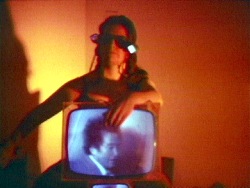Jud Yalkut
Biography
Jud Yalkut (1938-2013) was a pioneering intermedia artist and filmmaker. His remarkable body of moving image work, which spanned fifty years, ranged from early performance renderings and poetic filmic experiments to a series of groundbreaking hybrid video-film collaborations with Nam June Paik. Transcending and transforming media as he explored and merged film, video, expanded cinema, electronic manipulations, performance and installation, Yalkut created and collaborated on seminal intermedia projects with numerous artists, filmmakers, musicians and performers in the avant-garde and experimental scenes.
Starting in 1966 and continuing into the 1970s, he collaborated with Nam June Paik on a series of significant video-film pieces. In these seminal works, which include Videotape Study No. 3, Beatles Electroniques and Cinema Metaphysique, Yalkut and Paik create extraordinary conversations between the medium of film and the electronic manipulations of video.
Yalkut also used film and video to create kinetic reworkings of performances and art events, as seen in his vision of the 1966 and 1969 Avant-Garde Festivals; his vibrant 16mm film of the landmark 1969 exhibition TV as a Creative Medium; a 1973 video realization of Paik and Charlotte Moorman performing John Cage's 26'.1.1499" for String Player; and his digital rendering of Moholy-Nagy's 1930 kinetic sculpture Light-Space Modulator, among other works.
Yalkut was also active as a teacher, curator and writer over many decades. His 350-page manuscript Electronic Zen is an essential cultural history of the nascent alternative video scene.
In 1965 Yalkut became a resident filmmaker for USCO (now the Intermedia Foundation), a countercultural, multimedia collective in New York, and began exploring the merger of art and technology. While in New York, Yalkut also coordinated film programs for Charlotte Moorman's New York Avant Garde Festivals, and taught filmmaking courses at New York University, School of Visual Arts, and Millennium Film Workshop. In 1973, Yalkut left New York to start a video and film program at Wright State University in Dayton, Ohio and became one of the founders of Dayton's Visual Arts Center.
Yalkut was born in New York City in 1938. In the spring of 2013, the University of Dayton honored Yalkut with a comprehensive career retrospective, "Jud Yalkut: Visions and Sur-Realities." In 2013 Yalkut also participated in symposia at the Smithsonian Museum of American Art, Washington, D.C., and the Centre Georges Pompidou, Paris. In 2000, Yalkut was the subject of a one-man exhibition at the Whitney Museum of American Art, "Dream Reels: VideoFilms and Environments by Jud Yalkut."
Yalkut's film and video work has also been exhibited at venues including the Miami University Art Museum, Oxford, OH; The Museum of Modern Art and Anthology Film Archives in New York; Everson Museum, Syracuse, New York, among many others. He also organized exhibitions of video and experimental media art, such as "Computer Art: An Ohio Perspective" at the Dayton Visual Arts Center in 1993 and "Art From Virtual Realities" at DVAC in 1996. Yalkut was also a writer on the arts and media; his writings appeared in Film Quarterly, The Dayton Voice, and The New York Free Press, among other publications. The recipient of numerous grants and awards, including a Writing-In-Media grant from the New York State Council on the Arts for his manuscript Electronic Zen, Yalkut received six fellowships from the Ohio Arts Council and a Lifetime Achievement Fellowship in 2003 from the Montgomery County Arts and Cultural District. Yalkut lived in Dayton, Ohio until his death in 2013.
